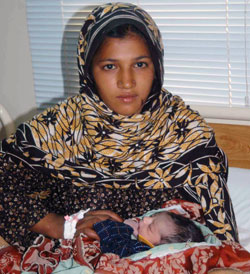Press Release
More Women Using Lifesaving Health Services One Year After Pakistan Quake
06 October 2006
Press Release
06 October 2006
MUZAFFARABAD, Pakistan — Many mothers and children in areas hit by last year’s earthquake in Pakistan have better access to health care than before the disaster, as a result of joint efforts to restore services.
Most survivors of the 8 October 2005 disaster, including the estimated 5,000 women who give birth each month, still face a range of threats to their health. Exposure, crowding, weak diets and bad sanitation compound pre-existing problems in this poor region, where birth rates are high, women typically deliver at home and maternal death is severe.
But one year on, mobile services and temporary health facilities set up by numerous aid agencies in collaboration with the Government are now reaching people throughout the affected districts, including areas that were poorly served prior to the earthquake.
More than 5,000 women have already given birth in pre-fabricated mother and child health facilities erected by UNFPA, the United Nations Population Fund. UNFPA is putting up 34 such facilities in Muzaffarabad and Mansehra districts, ranging from sophisticated maternity centres to basic health units.
The Fund also supports ten mobile clinics, reaching women and children in isolated villages that never had health services before.

The all-female, live-in staff in the UNFPA facilities provide primary care, prenatal checkups, and skilled deliveries round the clock. Hundreds of women have undergone lifesaving procedures.
Complicated cases can be referred to the birthing units at Mansehra district hospital and the AIMS hospital in Muzaffarabad, where UNFPA has provided equipment and support medical staff. Last month, doctors at the AIMS hospital conducted 406 deliveries, including 72 Caesarean sections.
“Pregnancy and childbirth are always dangerous in remote areas,” notes Dr. France Donnay, the UNFPA Representative in Pakistan. “The hardships suffered by the earthquake survivors have increased the risks women face. But lifesaving services are now widely available in the affected areas and, thankfully, women are using them more than ever before.”
***
UNFPA, the United Nations Population Fund, is an international development agency that promotes the right of every woman, man and child to enjoy a life of health and equal opportunity. UNFPA supports countries in using population data for policies and programmes to reduce poverty and to ensure that every pregnancy is wanted, every birth is safe, every young person is free of HIV/AIDS, and every girl and woman is treated with dignity and respect.
Contact Information:
Rabya Nizam
Islamabad
Tel.: + 0300-501-1105
Email: rabya.nizam@un.org.pk
Omar Gharzeddine
New York
Tel.: +1 (212) 297-5028
Email: gharzeddine@unfpa.org
William A. Ryan
Bangkok
Tel.: +66 2 288 2446
Email: ryanw@unfpa.org